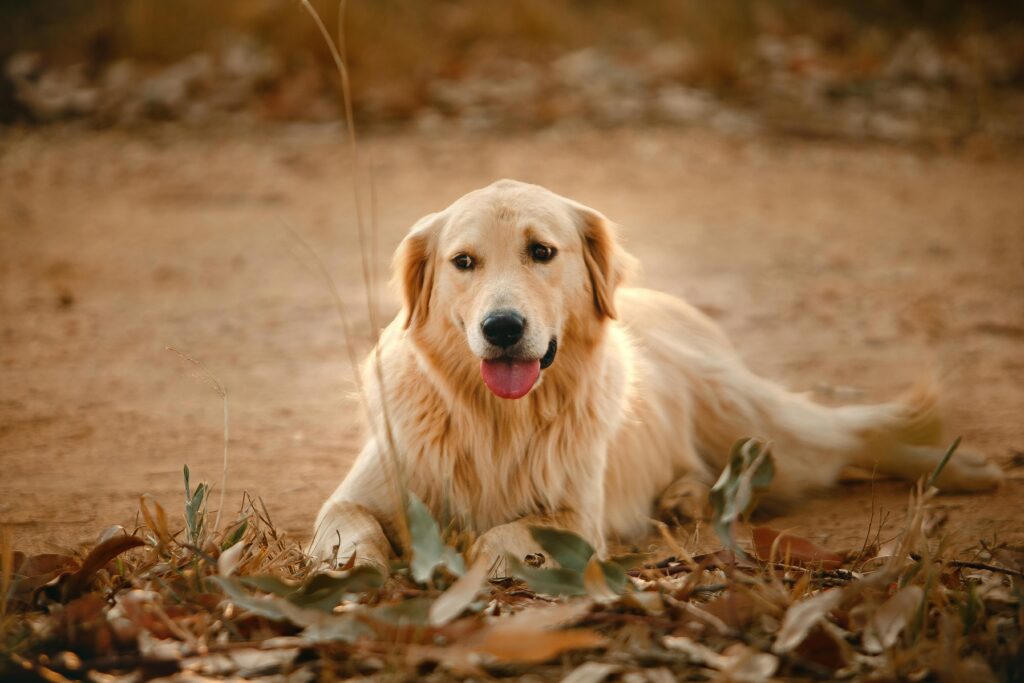Golden Retrievers are one of the most beloved dog breeds in the world. Their happy-go-lucky nature, loyalty, and gorgeous golden coats make them irresistible companions. But alongside their glowing reputation comes a heartbreaking reality: Golden Retrievers are tragically prone to cancer. If you’re a Golden owner or fan, you might have heard the scary statistic that a high percentage of them develop cancer in their lifetime.
But what percent of golden retrievers get cancer? Why is this breed so vulnerable? And most importantly, is there anything you can do to help your Golden live a longer, healthier life? Let’s dive deep into the facts, numbers, and hope behind this tough topic.
To find the perfect fit, learn more about what size collar for a Bichon, ensuring your dog’s comfort and safety.
Blog Highlights
ToggleWhat Percent of Golden Retrievers Get Cancer?
According to major studies, approximately 60% of Golden Retrievers will develop cancer at some point in their lives. That’s six out of every ten Goldens — a devastatingly high rate compared to other breeds.

One of the most cited studies comes from the Golden Retriever Lifetime Study, launched by the Morris Animal Foundation in 2012. This massive, ongoing research project follows over 3,000 purebred Goldens throughout their lives to understand cancer risks better. Early data confirms what veterinarians have long suspected: Goldens have one of the highest cancer rates of any dog breed.
In comparison:
- The general dog population has a cancer rate of about 25–30%.
- Breeds like Boxers and Bernese Mountain Dogs also have high rates, but not as dramatically as Goldens.
- Mixed breed dogs tend to have lower cancer rates overall.
When you look at these numbers side by side, it’s clear that Golden Retrievers face an unusually heavy burden when it comes to cancer risk.
Why Is Cancer So Common in Golden Retrievers?
Cancer in Golden Retrievers isn’t random — it’s tied to a mix of genetics, environmental factors, and even lifestyle choices.

1. Genetics
Golden Retrievers were originally bred for intelligence, beauty, and friendliness, but not necessarily for health longevity. Over generations, selective breeding emphasized specific physical and behavioral traits, inadvertently amplifying some genetic mutations that increase cancer susceptibility.
Certain genetic lines of Goldens — especially those bred from a small gene pool — carry hereditary predispositions to cancers like:
- Hemangiosarcoma (cancer of the blood vessels)
- Lymphoma (cancer of the lymphatic system)
- Mast cell tumors
- Osteosarcoma (bone cancer)
DNA studies have shown that Golden Retrievers have mutations in specific genes involved in tumor suppression and immune system regulation.
2. Environmental Factors
Like humans, dogs are exposed to environmental toxins daily. Pesticides, herbicides, industrial chemicals, polluted air, and contaminated water can increase the likelihood of cancer mutations.
Golden Retrievers’ lifestyle factors may also play a role — they are outdoor-loving dogs, often spending lots of time on grass that’s been chemically treated or drinking from outdoor water sources.
3. Hormonal Influence
Spaying and neutering at a young age have been linked to increased cancer risks in Golden Retrievers. Several studies suggest that early removal of hormones can impact how the body regulates cell growth, making it easier for cancers to develop later.
Golden Retrievers neutered before one year of age may have a higher chance of developing certain cancers compared to those neutered later or left intact.
Discover the ideal option by exploring what is the best collar material for a Bichon Frise to ensure your pet’s comfort and durability.
Types of Cancer Most Common in Golden Retrievers
Not all cancers are created equal — and unfortunately, Golden Retrievers are prone to some of the most aggressive types.
Here’s a quick breakdown of the most common cancers affecting the breed:
| Type of Cancer | Description | Frequency |
| Hemangiosarcoma | Cancer of blood vessels, often affecting the spleen or heart | Very Common |
| Lymphoma | Cancer of the lymph nodes and immune system | Very Common |
| Mast Cell Tumors | Skin cancer that can spread internally | Common |
| Osteosarcoma | Bone cancer, highly aggressive | Moderate |
| Soft Tissue Sarcomas | Cancer of connective tissues | Moderate |
Of these, hemangiosarcoma and lymphoma are the biggest killers, responsible for a significant portion of deaths among Goldens over age 8.

At What Age Do Golden Retrievers Typically Get Cancer?
While cancer can technically strike at any age, most Golden Retrievers diagnosed with cancer are between 6 and 12 years old.
Here’s a rough guide based on veterinary observations:
- Under 5 years old: Cancer is rare but not impossible (especially aggressive forms like lymphoma).
- 5–8 years old: Risk begins to rise noticeably.
- 8–10 years old: Peak cancer diagnosis period for most Goldens.
- 10+ years old: Risk remains high, but those reaching this age have often escaped the most aggressive genetic cancers.

That’s why regular vet screenings become critically important once your Golden reaches middle age (around 6 years old).
Symptoms of Cancer in Golden Retrievers
Catching cancer early can dramatically affect outcomes. Some common warning signs include:
- Unexplained weight loss
- Persistent swelling or lumps
- Sudden lethargy or depression
- Loss of appetite
- Difficulty breathing
- Unusual bleeding
- Sudden collapse (often a sign of internal bleeding from hemangiosarcoma)
Unfortunately, certain cancers like hemangiosarcoma are called “silent killers” because they often show no obvious symptoms until very advanced stages.
That’s why routine wellness exams and bloodwork every 6–12 months are essential, even if your Golden seems perfectly healthy.
The American Staffordshire Terrier’s coat type is short, sleek, and easy to maintain with regular brushing.
Can You Prevent Cancer in Golden Retrievers?
While you can’t completely prevent cancer — especially genetic cancers — there are smart steps you can take to reduce risk and increase early detection.
1. Careful Breeder Selection
If you’re getting a puppy, choose breeders who prioritize genetic health, conduct thorough testing, and avoid breeding lines with high cancer incidences. Reputable breeders often screen for known markers of cancer risk.
2. Nutrition Matters
Feeding a high-quality, minimally processed diet packed with antioxidants can strengthen your Golden’s immune system. Some owners switch to fresh, raw, or home-cooked diets to minimize preservatives and additives.
Key cancer-fighting foods for Goldens include:
- Blueberries
- Broccoli
- Pumpkin
- Turmeric (in safe doses)
- Fish oil (omega-3 fatty acids)
3. Delay Spaying/Neutering
Newer research suggests waiting until 18–24 months before spaying or neutering a Golden Retriever to reduce lifetime cancer risks, unless there’s a strong behavioral or medical reason to do it earlier.
Always consult with your vet for personalized advice.
4. Minimize Chemical Exposure
Avoid lawns treated with pesticides. Use natural cleaning products at home. Filter drinking water if possible. Goldens are naturally curious and absorb chemicals through their paws, fur, and mouths.
5. Regular Screenings
Annual vet exams aren’t optional for Goldens — they’re essential. Ask about regular blood panels, ultrasounds, and physical exams targeted toward early cancer detection once your Golden is over 5 years old.

Treatments Available for Golden Retrievers with Cancer
If cancer is diagnosed, there are several treatment paths depending on the type, stage, and your dog’s overall health:
- Surgical removal (for tumors or masses)
- Chemotherapy (especially for lymphoma)
- Radiation therapy
- Immunotherapy (emerging option for some cancers)
- Palliative care (comfort care if cure isn’t possible)
While cancer treatment in dogs isn’t cheap, many Goldens tolerate chemo and other therapies far better than humans do — often maintaining good quality of life during treatment.
Survival outcomes vary. For example:
- Early-stage mast cell tumors caught and removed surgically can lead to full recovery.
- Hemangiosarcoma, even with aggressive treatment, often has a poor prognosis (median survival around 6–12 months after diagnosis).
Personal Story: How One Golden Beat the Odds
One inspiring example is “Buddy,” a Golden Retriever diagnosed with lymphoma at age 7. After a grim prognosis, his owners chose to pursue chemotherapy along with a holistic diet change. Buddy not only tolerated treatment like a champ — he went into full remission and lived to 12. His energy, appetite, and zest for life amazed everyone who met him.
Stories like Buddy’s remind us that a cancer diagnosis isn’t always the end — sometimes it’s the beginning of a new, hopeful chapter.
The best collar size for an American Staffordshire Terrier ensures a comfortable and secure fit for your dog during walks and training.
Why the Golden Retriever Lifetime Study Matters So Much
The Golden Retriever Lifetime Study is the largest, most ambitious canine health study ever undertaken, specifically aimed at understanding why so many Goldens get cancer.
By tracking over 3,000 Golden Retrievers from puppyhood to old age — recording diet, environment, lifestyle, genetics, and health events — researchers hope to uncover clues not only to prevent cancer in Goldens but to help all dogs live longer.
Early findings already suggest environmental pollutants, early spay/neuter, and specific gene mutations play key roles.
By supporting or learning from this study, every Golden Retriever lover can help future generations of dogs live longer, healthier lives.
Final Thoughts: Cancer Is a Big Threat, But Knowledge Is Power
Hearing that 60% of Golden Retrievers will face cancer is heartbreaking — there’s no sugarcoating it. But there’s also real power in understanding these risks early. With proactive care, smart breeding practices, good nutrition, and regular vet monitoring, you can tip the odds in your Golden’s favor.
Every extra healthy year you give your Golden Retriever — full of games of fetch, beach trips, cuddle sessions, and goofy smiles — is a win worth fighting for. Hope so, now you know what percent of golden retrievers get cancer.
So don’t lose heart. Love them well, care for them wisely, and stay informed. Because no matter what, your Golden’s life, whether short or long, will shine with a love that even cancer can never dim.
To find out the what size collar for an Affenpinscher, ensure you measure your dog’s neck correctly for a perfect fit.





